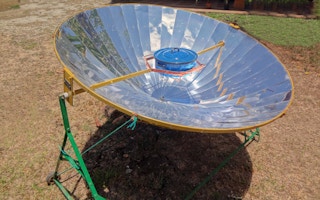Cooking using just the power of the Sun is not a new technology. Dozens of designs of solar cookers using mirrors and other shiny surfaces to concentrate the Sun’s rays are popular across the world, especially where electricity and wood for fires are in short supply.
Many thousands are in use in Africa, and they are very popular for large-scale communal cooking in China. They can be designed for boiling water, cooking stews, frying and baking.
But one problem is how to keep ovens hot enough, long enough, to cook such staples as bread, and how to maintain the temperature when the Sun goes in or at night.
Now an Ethiopian student working with colleagues in Norway thinks he has solved the problem. Instead of cooking the food directly with the Sun’s rays, his design concentrates the heat on a container holding a mixture of salts.
“
An Ethiopian student working with colleagues in Norway thinks he has solved the problem. Instead of cooking the food directly with the Sun’s rays, his design concentrates the heat on a container holding a mixture of salts
Traditional bread
These store the heat, releasing it gradually over 24 hours and maintaining a steady temperature of 220°C (428°F). This would make it possible for people in developing countries to cook food efficiently, safely and in an environmentally benign way at any time of day.
Asfafaw Tesfay came from Ethiopia to Norway in 2008 with the clear idea of developing a solar oven able to bake his country’s staple food, a flat bread called injera, which is traditionally served at every meal.
The problem of cooking the bread, which needs a high temperature, is particularly acute because large parts of the country are without access to electric power or wood. Only 3 per cent of Ethiopia is now forested, down from 35 per cent in 2000, and 85 per cent lacks an electricity grid.
Tesfay and other students from the the Norwegian University of Science and Technology (NTNU) are now looking to sell the cooker commercially, particularly in Ethiopia itself where they believe it is most needed. The oven can reach a temperature of 250⁰C(482⁰F), which makes it well adapted to the country’s food traditions and resources.
Storing heat
Tesfay and his fellow students Mari Hæreid, Sebastian Vendrig and Dag Håkon Haneberg, who work from the NTNU School of Entrepreneurship, say the cooker is the first of its kind. According to Even Sønnik Haug Larsen, who doubles as both a student and a teacher: “This oven has several advantages compared to other solar-powered ovens on the market. The biggest difference is that it can reach a high temperature and store that high temperature over time, which makes it perfect for baking injera.”
The students see a potential market in organisations working in the countryside, schools, universities, hospitals, bakeries, restaurants and hotels. Later they hope to make the oven available to private individuals, but many are poor and would have to be trained how to use it.
Haug Larsen and his fellow student Sebastian Vendrig travelled to Ethiopia around mid-January to contact customers and potential partners. At the same time they wanted to see if it was possible to produce the oven locally in Mekele, the home city of Asfafaw, the man behind the idea.
They want to establish a viable business there and look at possible production workshops as part of a Norwegian scheme for technology transfer.
“It would be fantastic if our product could improve conditions in several developing countries, and if we can be part of creating jobs locally,” said Haug Larsen.

















